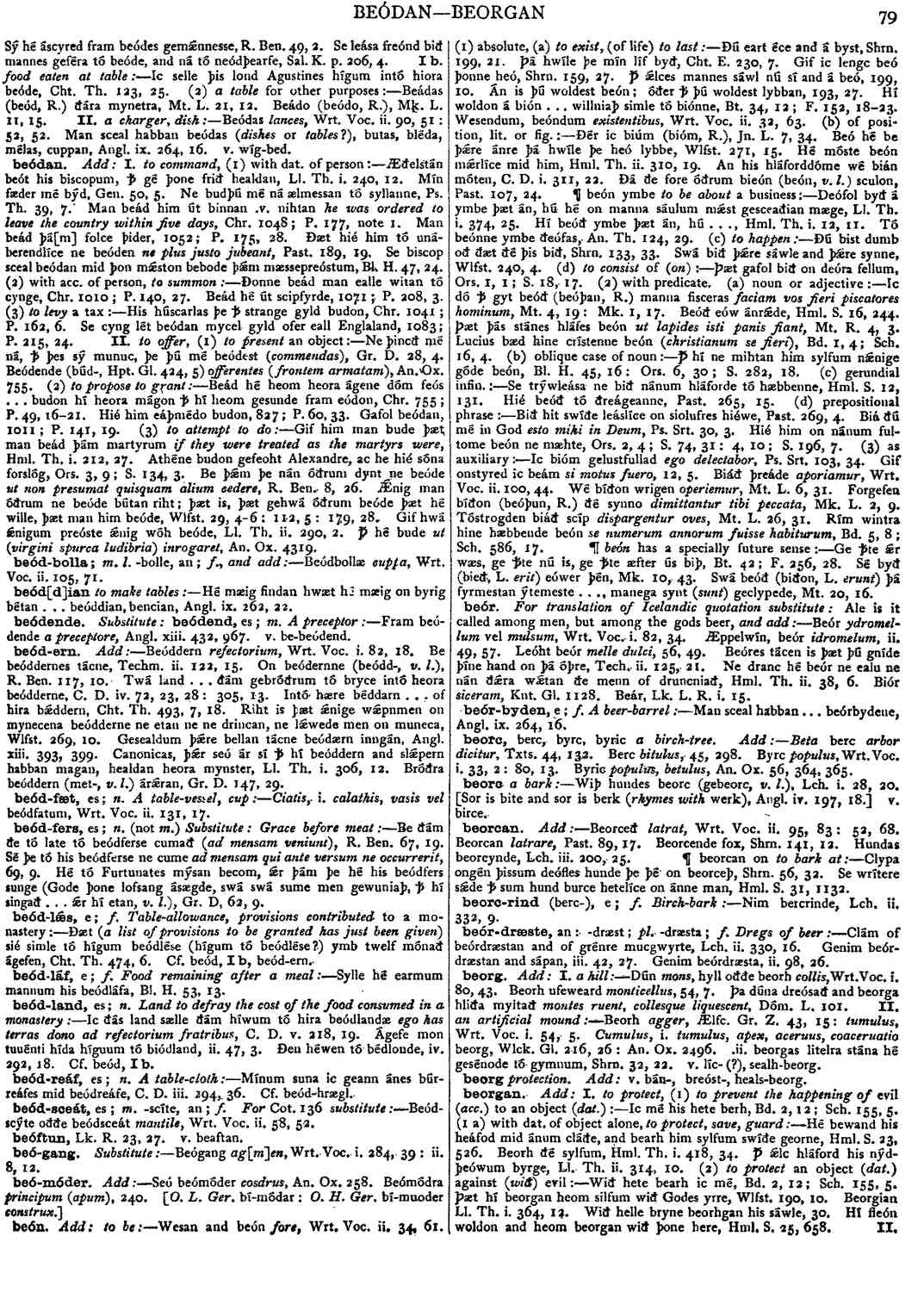beón
-
Wesan and beón
fore,
- Wrt. Voc. ii. 34, 61.
-
Ðú eart éce and á byst,
- Shrn. 199, 21.
-
Þá hwíle þe mín líf byð,
- Cht. E. 230, 7.
-
Gif ic lengc beó þonne heó,
- Shrn. 159, 27. ꝥ
-
Án is þú woldest beón; óðer ꝥ þú woldest lybban,
- 193, 27.
-
Hí woldon á bión . . . willniaþ simle tó biónne,
- Bt. 34, 12; F. 152, 18-23.
-
Wesendum, beóndum
existentibus.
- Wrt. Voc. ii. 32, 63.
-
Ðér ic biúm (bióm,
- R.), Jn. L. 7, 34.
-
Beó hé be þǽre ánre þá hwíle þe heó lybbe,
- Wlfst. 271, 15.
-
Hé móste beón mǽrlíce mid him,
- Hml. Th. ii. 310, 19.
-
An his hláforddóme wé bián móten,
- C. D. i. 311, 22.
-
Ðá ðe fore óðrum bieón (beón, v. l.) sculon, Past. 107, 24. ¶ beón ymbe
to be about
a business :-- Deófol byð á ymbe þæt án, hú hé on manna sáulum mǽst gesceaðian mæge,- Ll. Th. i. 374, 25.
-
Hí beóð ymbe þæt án, hú . . . ,
- Hml. Th. i. 12, II. Tó
-
Ðú bist dumb oð ðæt ðé þis bið,
- Shrn. 133, 33.
-
Swá bið þǽre sáwle and þǽre synne,
- Wlfst. 240, 4.
-
Þæt gafol bið on deóra fellum,
- Ors. l, l; S. 18, 17.
-
Ic dó ꝥ gyt beóð (beóþan, R.) manna fisceras
faciam vos fieri piscatores hominum,
- Mt. 4, 19: Mk. I. 17.
-
Beóð eów ánrǽde,
- Hml, S. 16, 244.
-
Þæt þás stánes hláfes beón
ut lapides isti panis fiant,
- Mt. R. 4, 3.
-
Lucius bæd hine crístenne beón
(christianum se fieri),
- Bd. 1, 4; Sch. 16, 4.
-
ꝥ hí ne mihtan him sylfum nǽnige góde beón,
- Bl. H. 45, 16: Ors. 6, 30; S. 282, 18.
-
Se trýwleása ne bið nánum hláforde tó hæbbenne,
- Hml. S. 12, 131.
- Hié beóð tó ðreágeanne. Past. 265, 15.
-
Bið hit swíðe leáslíce on siolufres hiéwe,
- Past. 269, 4.
-
Biá ðú mé in God
esto mihi in Deum,
- Ps. Srt. 30, 3.
-
Hié him on nánum ful-tome beón ne mæhte,
- Ors. 2, 4; S. 74, 31: 4, 10; S. 196, 7.
-
Ic bióm gelustfullad
ego deleclabor.
- Ps. Srt. 103, 34.
-
Gif onstyred ic beám
si motus fuero,
- 12, 5.
-
Biáð þreáde
aporiamur,
- Wrt. Voc. ii. 100, 44.
-
Wé bíðon wrigen
operiemur,
- Mt. L. 6, 31.
-
Forgefen bíðon (beóþun, R.) ðé synno
dimittantur tibi peccata,
- Mk. L. 2, 9.
-
Tóstrogden biáð scíp
dispargentur oves,
- Mt. L. 26, 31.
-
Rím wintra hine hæbbende beón se numerum annorum fuisse habiturum. Bd. 5, 8; Sch. 586, 17. ¶
beón
has a specially future sense :-- Ge ꝥte ǽr wæs, ge ꝥte nú is, ge ꝥte æfter us biþ,- Bt. 42; F. 256, 28.
-
Sé byð (bieð, L.
erit
) eówer þén,- Mk. 10, 43.
-
Swá beóð (biðon, L. erunf) þá fyrmestan ýtemeste . . . , manega synt
(sunt)
geclypede,- Mt. 20, 16.
Bosworth, Joseph. “beón.” In An Anglo-Saxon Dictionary Online, edited by Thomas Northcote Toller, Christ Sean, and Ondřej Tichy. Prague: Faculty of Arts, Charles University, 2014. https://bosworthtoller.com/39968.
Checked: 0